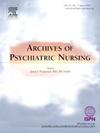The relationship between response to treatment and perceived stress, childhood trauma and psychological resilience in anxiety disorders and attention-deficit hyperactivity disorder in adolescents: A comparative study from Türkiye
IF 2.2
4区 医学
Q1 NURSING
引用次数: 0
Abstract
Objective
In recent years, personalized treatments and factors affecting treatment response have gained importance in psychiatry. This study aimed to evaluate the effect of perceived stress, childhood trauma, and resilience levels on response to treatment in anxiety disorders (AD) and attention-deficit hyperactivity disorder (ADHD) in adolescents.
Method
A total of 202 adolescents were included in this study. The treatment response of patients with AD and ADHD who were diagnosed according to DSM-5 criteria and used pharmacological treatment was determined by using the Clinical Global Impression- Improvement scale in their control examinations. Forty patients with AD who responded to treatment (AD/Responder), 35 patients who did not respond (AD/Non-responder), 55 treatment responder patients with ADHD (ADHD/Responder), and 21 non-responder patients (ADHD/Non-responder), and 51 healthy controls (HC) were included in the study. They completed the Perceived Stress Scale (PSS), Childhood and Youth Resilience Measure-12 (CYRM-12), and Childhood Trauma Questionnaire (CTQ).
Results
The PSS score was found to be significantly lower in the ADHD/Responder group compared to AD/Responder and ADHD/Non-responder groups. The PSS score was lower, and CYRM-12 score was significantly higher in the ADHD/Responder and HC groups compared to the AD/Non-responder group. Emotional abuse scores, a subscale of CTQ, were considerably higher in the AD/Non-responder group compared to AD/Responder and ADHD/Responder. There were significant positive correlations between PSS and CTQ and its subscale scores; negative correlations were found between CYRM-12 and CTQ scores and CYRM-12 and PSS scores in groups.
Conclusions
There were considerable relationships between treatment response and resilience, perceived stress and emotional abuse in adolescents with AD and ADHD. In addition to drug treatments, resilience and stress-based interventions can be used to increase treatment response especially in AD.
青少年焦虑障碍和注意缺陷多动障碍的治疗反应与感知压力、童年创伤和心理弹性的关系:来自 rkiye的比较研究
目的近年来,个性化治疗及其影响治疗反应的因素在精神病学中越来越受到重视。本研究旨在评估感知压力、童年创伤和弹性水平对青少年焦虑症(AD)和注意力缺陷多动障碍(ADHD)治疗反应的影响。方法本研究共纳入202名青少年。根据DSM-5标准诊断并使用药物治疗的AD和ADHD患者的治疗反应通过在对照检查中使用临床总体印象改善量表来确定。该研究包括40例对治疗有反应的AD患者(AD/Responder), 35例无反应的AD患者(AD/Non-responder), 55例治疗有反应的ADHD患者(ADHD/Responder), 21例无反应的ADHD患者(ADHD/Non-responder)和51例健康对照(HC)。他们完成了感知压力量表(PSS)、儿童和青少年弹性测量量表-12 (CYRM-12)和儿童创伤问卷(CTQ)。结果ADHD/响应者组的PSS评分明显低于AD/响应者组和ADHD/非响应者组。与AD/无反应组相比,ADHD/反应组和HC组的PSS评分较低,CYRM-12评分显著较高。情绪虐待得分(CTQ的一个子量表)在AD/无反应组中明显高于AD/反应组和ADHD/反应组。PSS与CTQ及其分量表得分呈显著正相关;各组间CYRM-12与CTQ评分、CYRM-12与PSS评分呈负相关。结论青少年AD / ADHD患者的治疗反应与心理恢复力、感知压力和情绪虐待存在一定的关系。除药物治疗外,恢复力和基于压力的干预措施可用于提高治疗反应,特别是对阿尔茨海默病。
本文章由计算机程序翻译,如有差异,请以英文原文为准。
求助全文
约1分钟内获得全文
求助全文
来源期刊
CiteScore
3.70
自引率
0.00%
发文量
131
审稿时长
160 days
期刊介绍:
Archives of Psychiatric Nursing disseminates original, peer-reviewed research that is of interest to psychiatric and mental health care nurses. The field is considered in its broadest perspective, including theory, practice and research applications related to all ages, special populations, settings, and interdisciplinary collaborations in both the public and private sectors. Through critical study, expositions, and review of practice, Archives of Psychiatric Nursing is a medium for clinical scholarship to provide theoretical linkages among diverse areas of practice.

 求助内容:
求助内容: 应助结果提醒方式:
应助结果提醒方式:


